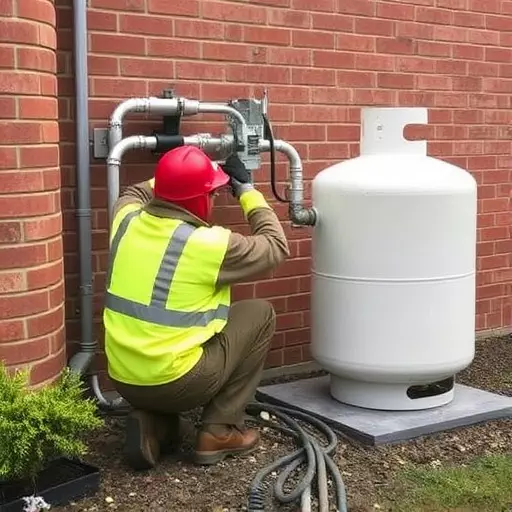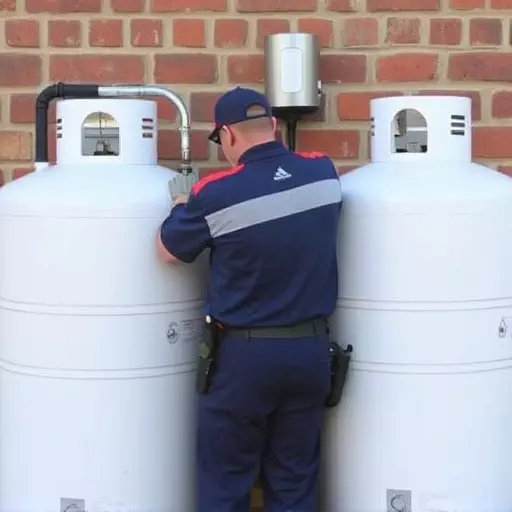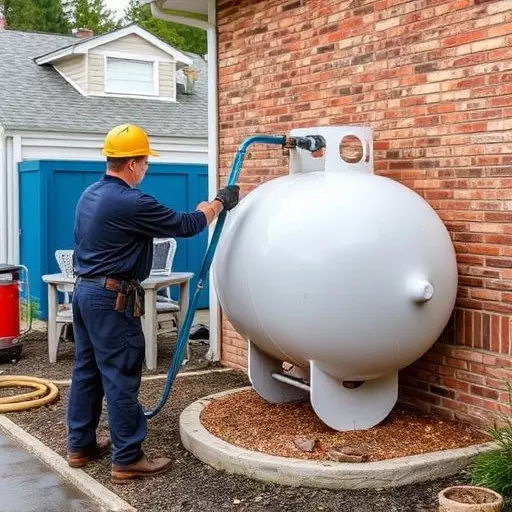Residential propane tank installations in Camden, NJ, require certified professionals to prevent leaks and ensure safety. Common causes include faulty connections due to unskilled setup or substandard gear. Experts use specialized knowledge, advanced tools, and leak detection technology for secure installations, adhering to strict protocols. Regular maintenance by these experts is vital for safe and efficient system operation, extending tank lifespans and safeguarding homes. Engage certified propane tank installation services in Camden for reliable energy solutions.
During residential propane tank installation in Camden, New Jersey, identifying leaks is paramount for safety. This article explores the intricacies of propane leak detection, focusing on common causes and associated risks during installation. We highlight the indispensable role of certified experts in ensuring accurate leak identification. Additionally, we provide a comprehensive step-by-step guide to installation with enhanced safety measures and offer preventive maintenance tips for optimal residential propane tank system performance.
- Understanding Propane Leaks During Installation: Common Causes and Risks
- The Role of Certified Experts in Effective Leak Detection
- Step-by-Step Guide: Propane Tank Installation with Enhanced Safety Measures
- Preventive Maintenance Tips for Residential Propane Tank Systems
Understanding Propane Leaks During Installation: Common Causes and Risks
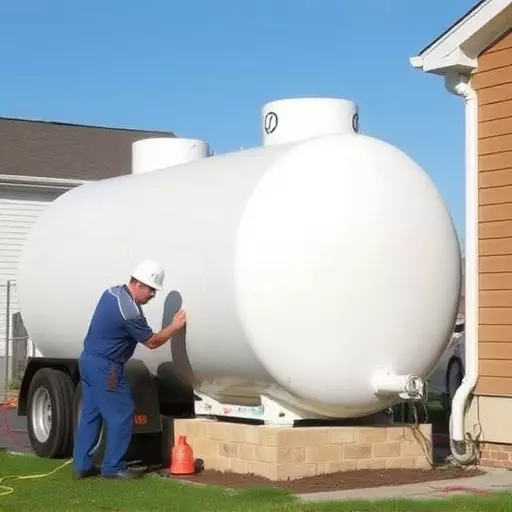
Propane leaks during installation are a serious concern for both residential propane tank experts in Camden, New Jersey, and homeowners alike. Understanding common causes is key to mitigating risks effectively. One of the primary reasons for leaks is often improper sealing or connecting of lines during setup. This can include faulty connections at the tank, regulator, or appliances, leading to potential gas escape and safety hazards.
Another significant factor is using uncertified or substandard equipment. Camden’s residential propane tank installation services should always be handled by experts who follow industry best practices and adhere to safety standards. Insufficient training or disregard for protocol can result in leaks, which may go undetected until they pose a greater risk, emphasizing the importance of engaging certified propane tank installation experts for any residential setups.
The Role of Certified Experts in Effective Leak Detection
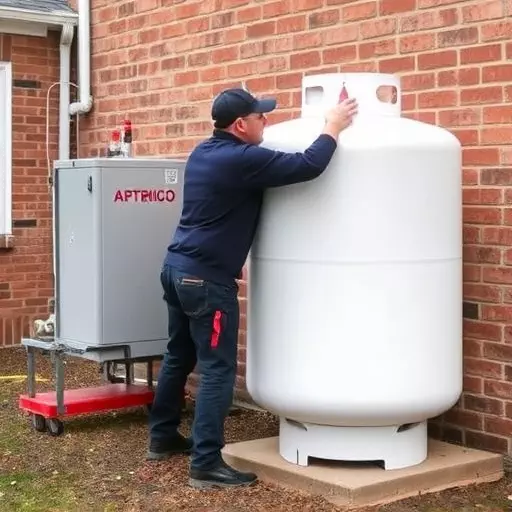
When it comes to residential propane tank installation in Camden, New Jersey, turning to certified professionals is paramount for effective leak detection. These experts are equipped with specialized knowledge and tools to ensure that your propane tank is securely installed, maintained, and monitored for any potential leaks. They follow stringent safety protocols and industry standards, which are crucial for preventing accidents and ensuring the safety of your home and family.
Certified propane tank installation experts employ advanced techniques and technologies to identify even the smallest of leaks. By utilizing detection devices designed to pinpoint gas escapes, they can navigate complex installations and quickly address any issues. This not only extends the lifespan of your tank but also safeguards against potentially hazardous situations. Their expertise is invaluable in the world of residential propane tank installations, ensuring a secure and reliable energy source for homes across Camden, NJ.
Step-by-Step Guide: Propane Tank Installation with Enhanced Safety Measures
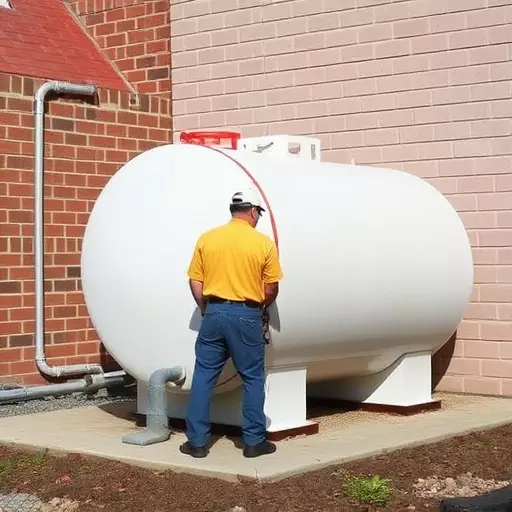
During a residential propane tank installation in Camden, New Jersey, prioritizing safety is paramount for both homeowners and certified propane tank installation experts alike. Here’s a step-by-step guide that highlights enhanced safety measures to ensure a seamless process:
1. Pre-Installation Assessment: Before setting foot on the property, experts conduct a thorough assessment of the area, checking for potential hazards and ensuring compliance with local regulations. This includes evaluating the placement of the tank, access points, and clearances required by law.
2. Safety Gear and Protocol: Once on-site, certified professionals don appropriate safety gear, including protective clothing, eye wear, and respiratory equipment. They establish safe work zones, implement one-way traffic patterns to prevent accidental crossings, and use isolated valve systems for controlled gas manipulation.
3. Leak Detection and Monitoring: Throughout the installation process, experts employ state-of-the-art leak detection technology. This includes specialized devices that continuously monitor for propane leaks, ensuring immediate response to any potential issues. Regular visual inspections are also conducted to identify any signs of a leak or damage.
4. Secure Tank Placement: Proper tank placement is crucial for safety and longevity. Experts follow strict protocols when digging and installing the tank, ensuring it’s securely anchored in place with adequate clearances from structures and other obstructions. They verify the stability and integrity of the tank’s foundation before proceeding to subsequent steps.
5. Final Connections and Testing: After successful tank placement, certified technicians carefully make final connections, strictly adhering to manufacturer guidelines. They perform pressure tests and leak checks under controlled conditions to ensure all systems are secure. Only upon successful completion of these safety measures is the propane system deemed operational.
Preventive Maintenance Tips for Residential Propane Tank Systems

Regular maintenance is key to ensuring your residential propane tank system operates safely and efficiently. Certified propane tank installation experts in Camden, New Jersey, recommend implementing preventive measures to safeguard against potential leaks and extend the life of your equipment. One crucial step is scheduling routine inspections at least once a year, allowing professionals to thoroughly assess connections, valves, and pipes for any signs of damage or corrosion.
Additionally, it’s vital to promptly address any unusual noises or odors emanating from the tank or surrounding areas. These could be early indicators of leaks that require immediate attention. Other preventive tips include keeping the area around the propane tank clear of debris and vegetation, ensuring proper ventilation in enclosed spaces where tanks are installed, and regularly testing pressure relief devices for optimal functionality.
